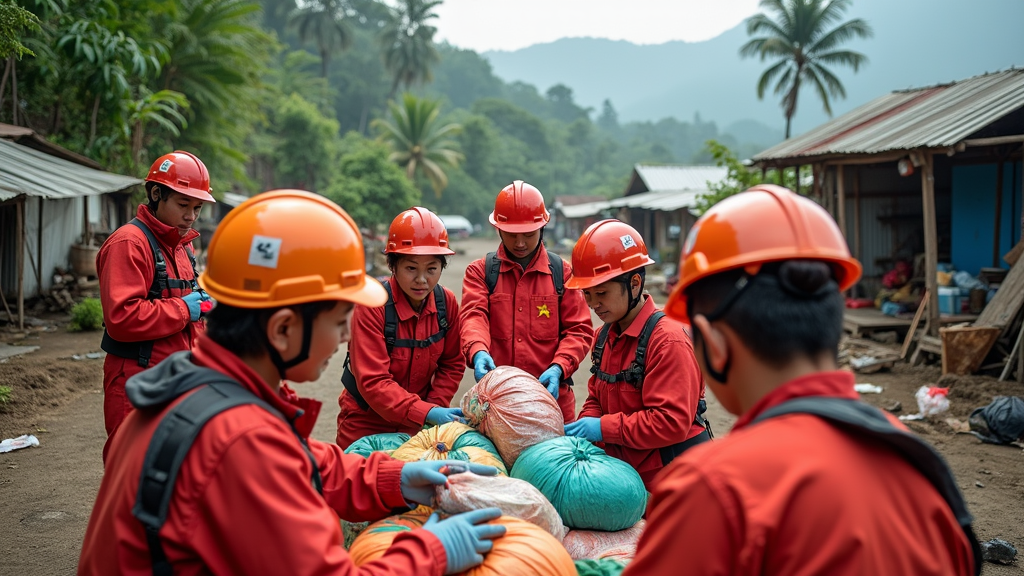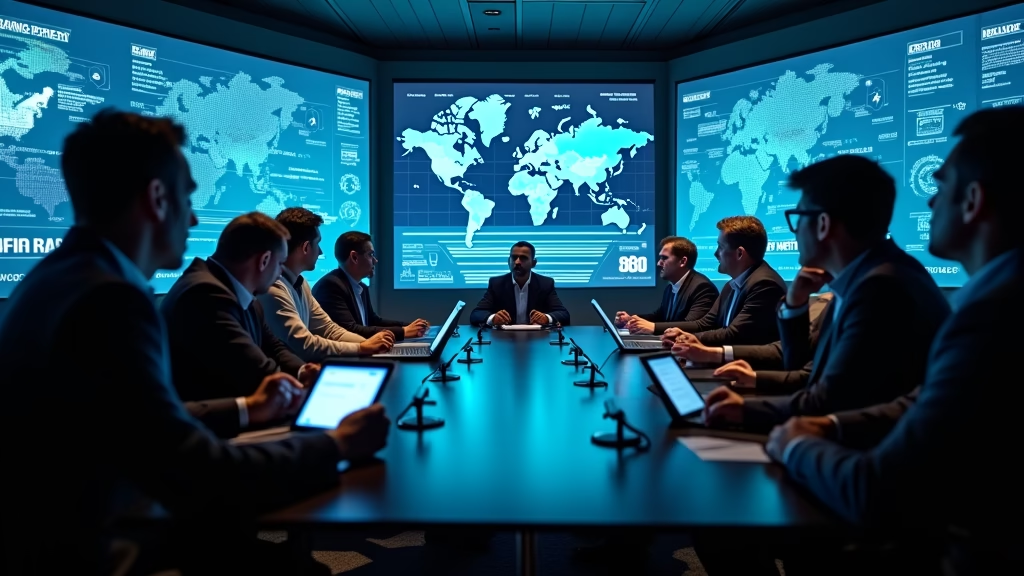Global Political Trends: Analysis and Implications
Understanding the Complexities of Global Political Dynamics
Analyzing global political trends is crucial for comprehending contemporary geopolitical shifts and their extensive implications on international relations. These trends significantly influence global economic structures, societal cohesion, and policy-making frameworks. From international climate agreements and intricate trade negotiations to cybersecurity challenges, contemporary politics directly shape global interactions, affecting billions worldwide. As former UN Secretary-General Ban Ki-moon stated, “The intricacies inherent in today’s global landscape necessitate heightened international cooperation and meticulously informed policy adjustments.”
This article critically explores major global political trends, examines their multidimensional impacts, and evaluates the sophisticated mechanisms utilized by international stakeholders to navigate these complex scenarios.
Key Global Political Trends Affecting International Relations
1. Rise of Populism and Nationalism
Recent decades have marked a notable resurgence in populism and nationalism, significantly reshaping global political landscapes. Noteworthy examples include political developments in the United States under Donald Trump, Hungary under Viktor Orbán, Brazil under Jair Bolsonaro, and India under Narendra Modi.
Populist movements have profoundly impacted diplomatic relations, often fostering protectionism and escalating international tensions. According to a Pew Research Center survey, more than half of Europeans perceive rising nationalism as a considerable threat to democratic institutions and the integrity of international relations. Nationalist policies have intensified economic conflicts, undermined multilateral cooperation, and resulted in diplomatic isolation.
2. Digital Transformation and the Rise of Cybersecurity
The proliferation of digital technologies has dramatically transformed the international political environment, positioning cybersecurity as a fundamental issue within global politics. Cyber threats increasingly jeopardize economic infrastructure, national security systems, and essential societal services. Prominent cyber-attacks, such as those against Estonia in 2007 and ransomware incidents in the United States in 2020, highlight significant national vulnerabilities.
Furthermore, rapid advancements in artificial intelligence, quantum computing, and blockchain technology amplify cybersecurity challenges. Consequently, international stakeholders are compelled to establish collaborative frameworks and enhance cybersecurity strategies to systematically manage these emerging threats.
3. Climate Change and International Collaboration
Climate change continues to serve as a crucial driver of global policy changes, underscoring the urgent need for extensive international cooperation. The Paris Agreement, ratified by nearly 200 countries, represents a significant diplomatic accomplishment, reflecting global acknowledgment of shared environmental responsibilities. Nonetheless, persistent disputes over funding, differentiation of responsibilities between developed and developing countries, and equitable obligation allocation frequently impede effective global action.
Severe climate impacts on regions such as the Maldives, Bangladesh, and various African countries further underscore the urgency and complexity involved in coordinating global policies aimed at sustainable and effective climate action.
4. Shifting Geopolitical Alliances
The contemporary geopolitical landscape experiences dynamic realignments influenced by emerging powers and changing traditional alliances. China’s Belt and Road Initiative and Russia’s expanded involvement in the Middle East exemplify strategic geopolitical shifts with significant implications for global governance and regional stability.
Such realignments alter diplomatic dynamics, influence international economic agreements, and reshape global security structures, complicating international cooperation and strategic diplomacy.
Impact of Global Political Trends
Economic Implications
Global political trends profoundly affect international economic stability. For example, the US-China trade dispute disrupted global trade, contributing to approximately a 0.8% reduction in global GDP growth, as reported by the International Monetary Fund (IMF). Similarly, Brexit significantly disrupted trade and foreign investment between the UK and the European Union.
Economic sanctions, protectionist policies, and diplomatic tensions continue to destabilize global markets and supply chains, highlighting the interconnectedness of political decisions and economic outcomes.
Sociocultural Consequences
Political developments inevitably affect social and cultural domains, intensifying societal divisions and influencing immigration policies, cultural integration, and minority rights. The socio-political effects of Brexit and rising xenophobia within Europe demonstrate how political shifts can significantly disrupt societal cohesion.
Furthermore, political polarization in countries like the United States and Brazil illustrates how extreme ideological divides, amplified by social media, exacerbate societal tensions and diminish social resilience.
Security and Stability Risks
Political dynamics frequently escalate into security crises, affecting regional and international stability. The ongoing geopolitical tensions between Russia and Ukraine exemplify how political conflicts can rapidly escalate into extensive humanitarian and security crises, challenging diplomatic efforts and global stability.
Persistent instability in regions such as the Middle East and parts of Africa underscores the need for sustained international engagement through diplomatic mediation, conflict resolution, and humanitarian intervention.
Strategic Responses to Global Political Challenges
Strengthening Multilateral Institutions
Effective international institutions like the United Nations, the World Trade Organization, and NATO are essential for managing contemporary political dynamics. Strengthening these institutions improves dispute resolution mechanisms, promotes adherence to international law, and fosters diplomatic cooperation, thereby enhancing global stability.
Diplomatic Engagement and Conflict Resolution
Proactive diplomacy is critical for managing global tensions. Recent diplomatic achievements, such as normalization agreements between Israel and several Arab nations, illustrate effective diplomacy’s potential in navigating complex geopolitical landscapes. Ongoing diplomatic engagement, preventive frameworks, and strategic dialogues among international stakeholders remain essential for conflict mitigation and cooperation.
Prioritizing Cybersecurity Investments
The escalating prevalence of cyber threats necessitates robust cybersecurity frameworks. International cooperation through information-sharing, cybersecurity drills, and standardized policies significantly strengthens global cyber defenses. Investing in cybersecurity infrastructure, workforce training, and establishing international cybersecurity norms are essential strategies for addressing emerging threats effectively.
Future Trajectories in Global Politics
Global political dynamics will continue evolving, influenced by technological advancements, shifting power structures, and emerging global challenges. Increasing multipolarity, driven by influential roles played by China, India, Russia, Brazil, and other emerging economies, indicates complex future interactions. Technological innovations in artificial intelligence, quantum computing, and space exploration are poised to further influence global political and diplomatic interactions.
Foreign Policy analysts anticipate increased geopolitical competition combined with indispensable international cooperation in addressing global challenges such as climate change, pandemics, cybersecurity threats, economic disparities, and security crises.
Conclusion: Navigating the Complexity of Global Politics
Effectively managing contemporary global political trends requires informed decision-making, proactive international cooperation, and adaptable policy frameworks. Global stability, economic prosperity, and social cohesion depend on collective international understanding and strategic responses to these evolving dynamics.
As former President Barack Obama emphasized, “Our destinies remain intertwined, demanding coordinated global responses to challenges like climate change, cybersecurity threats, and geopolitical tensions.” Comprehensive understanding and proactive engagement with global political dynamics remain crucial for sustaining robust international relations and ensuring future global prosperity.
latest video
news via inbox
Subscribe to the latest news in the world of politics and technology







